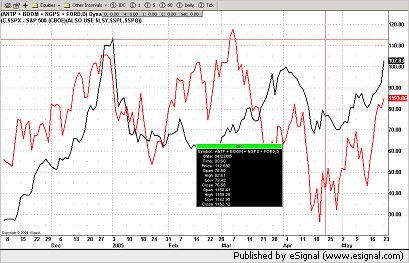You've read all the books on technical analysis. It makes it seem so easy. So you begin trading and realize that a profit is not so easy. The big boys have read all the books you have. They understand what the tech and daytraders look for. It is for this reason that big boys who want to unload a big chunk of stock, buy first, run the price past resistance, which attracts the daytraders to start buying and then unload their size on the all too willing technical traders. It is perhaps why many of these authors who were profitable decided to start writing for a living instead of trading. One thing very few of these market books do is provide a statistical analysis of their system over a wide sample. If someone says a profitable strategy is to buy 50% retracements, how about showing us how many such retracements there were in the past, and how many of them were profitable/losses, what the average profit/loss is, and if this works as well today as it has in the past.
Many daytraders think they can predict the market, outrunning the big boys. Unfortunately you can't see what the big boys are doing, but they can see you. The brokerages know who the daytraders are, and they very willing to tell their big commission payers (hedge funds) what positions they are in. The funds take positions against them knowing these traders either have stops that can be triggered or have to exit by the end of the day. If you think your too small to be noticed, often there are droves of others doing what you which makes it worthwhile for the big boys to target you. It is for this reason I rarely daytrade and I always choose my market carefully.
Often I see people try to trade the biggest markets out there. Choosing companies of the S&P 500. I think this is a mistake unless you are a long term investor (buy and hold). First off you have pension funds who are only allowed to buy companies in the S&P 500. They have multiple analysts per S&P company + pay lots of $ to other research firms, for an individual to have an advantage over them is slim. On top of that you have the mutual funds who try to outsmart the mammoth pension funds, and the hedge funds who try to outdo the mutual funds. The level of competition is intense.
I prefer to find the smaller cap growth companies. Many of these companies are too small in market cap to be traded by pension and mutual funds. You can find many that show earnings growth far superior to S&P 500 companies, which is a key factor in the price and multiple a stock trades at. Often these companies have very few shares outstanding, so when the big boys can start buying the stock, it will really move.



